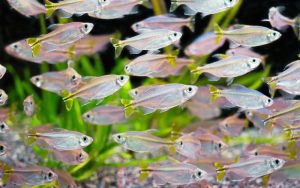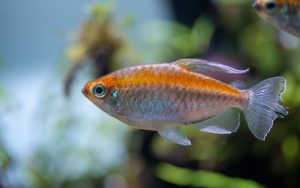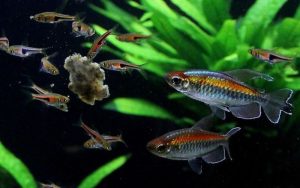If you’re an aquarium hobbyist, odds are you’ve wondered, “Do guppies eat plants?” This question is understandable as guppies are popular for aquarium enthusiasts worldwide, and you’d want to provide them with the best environment possible.
In this ultimate blog post, we will explore this intriguing question and dive deep into the world of guppies and their dietary preferences.
We’ll also share a curated list of the seven best live plants you can add to your guppies’ tank, ensuring they have vibrant, healthy, and interactive surroundings. Join us as we embark on creating a perfect little underwater haven for your guppies.
Table of Contents
ToggleAre Guppies Herbivorous?
Guppies are not herbivorous; they are omnivorous. While they consume plant matter, such as algae, they feed on small insects and other invertebrates. In their natural habitat, guppies often nibble on algae and other organic materials found in the water.

However, they supplement their diet with protein-rich foods to meet their nutritional needs. This flexibility in their diet allows guppies to adapt to different environments and thrive in a wide range of conditions.
Therefore, it is crucial for guppies kept in aquariums to be provided with a balanced diet that includes both plant-based and animal-based foods to ensure their overall health and well-being.
Do Guppies Eat Plants?
Do guppies eat live plants? Yes, guppies nibble on plants but don’t eat them. Instead, they feed on the algae attached to the aquatic plants. This is because algae provide guppies with the plant-based nutrition they need.
Guppies are omnivores, which means they eat both plants and animals. However, they are less voracious plant eaters than other fish species. Many guppies will do fine in a tank with live plants if given a balanced diet with plenty of plant-based foods.
Many different types of live plants can be kept in a guppy tank. Some of the best options include:
- Anubias: This hardy plant is easy to care for and can tolerate many water conditions.
- Java fern: Another easy-care plant, java fern is also beautiful and can provide plenty of hiding places for your guppies.
- Water wisteria: This fast-growing plant is a great way to help keep your tank water clean.
- Hornwort: A floating plant, hornwort is a good choice for tanks with high light levels.
These are just a few live plants that can be kept in a guppy tank. With some research, you can find the perfect plants to create a beautiful and healthy home for your fish.
Live plants are an essential part of any guppy tank. They provide food and shelter and help to keep the water clean. When choosing live plants for your guppy tank, it is crucial to consider the size of your tank, the amount of light you have, and the water conditions. With some planning, you might create a beautiful, thriving guppy tank with live plants.
Are Plants Safe for Guppies?
Guppies are generally safe with plants if they are not toxic or harmful. Plants can provide various benefits to guppies, such as shelter, spawning grounds, and food sources.
However, it is essential to note that guppies may also eat the plants, especially if they are hungry or the plants resemble their natural diet of algae and small insects. Therefore, choosing plants suitable for guppies diet is advisable and has a high chance of survival in an aquarium environment.
Additionally, providing a balanced diet and enough food for the guppies can reduce the likelihood of them resorting to eating plants as a source of sustenance.
Do Guppies Like Live Plants?
Guppies are a popular choice for aquarium enthusiasts, and many people wonder if guppies like natural plants. The truth is guppies do enjoy having real plants in their aquarium. They provide a natural environment for the fish and offer places to hide and explore.
Fake plants can look nice, but guppies are more likely to interact with natural plants. While counterfeit plants may require less maintenance, guppies need the benefits of real plants.
Different types of plants can be introduced into the aquarium, such as the floating plant, which guppies particularly enjoy, so whether or not guppies like natural plants is not a question, as these plants are a valuable addition to their habitat.
What Plants Do Guppies Eat?
What aquatic plants do guppies eat? Guppies are small tropical fish commonly kept in aquariums. Guppies rely on a varied diet in their tank, including plant and animal matter. When it comes to plants, guppies are omnivorous and will readily consume various types.
Some popular guppy plant options include Java moss, water lettuce, flame moss, and duckweed. These plants provide the guppies with essential nutrients and serve as hiding spots and breeding grounds.
It is important to note that guppy fish are known to nibble on the leaves of the plants in their tank, so it is advisable to choose sturdy plants that can withstand their feeding behavior. Additionally, the plants require an adequate supply of light, nutrients, and carbon dioxide to thrive in the fish tank.
7 Best Aquarium Plants for Guppies Tank
1. Guppy Grass (Najas guadalupensis)
Guppy Grass is a fast-growing aquatic plant that guppies love to nibble on. Its dark green appearance provides an excellent hiding place for guppy fry, giving them a haven from adult fish. Guppy grass is easy to care for, making it a perfect choice for beginners. Additionally, grass plants help to maintain good water quality by absorbing excess nutrients, which contributes to a healthy environment for your guppies.
2. Java Fern (Microsorum pteropus)
Java Fern is a hardy plant that can withstand various water conditions. It has broad, leathery leaves that offer shelter for guppy fry. Java Fern is a slow-growing plant, so it will only overcrowd your tank slowly. This plant does not require planting in the substrate; it can be attached to rocks or driftwood. Guppies enjoy grazing on Java Fern, making it an ideal addition to your tank.
3. Amazon Sword (Echinodorus amazonicus)
Amazon Sword is famous among aquarists for its striking appearance and easy care requirements. It features long, sword-shaped leaves that create a lush background in your aquarium. Guppies love to explore the dense foliage of the Amazon Sword, and it provides excellent coverage for guppy fry. This plant also absorbs excess nutrients, helping to maintain water quality.
4. Water Wisteria (Hygrophila difformis)
Water Wisteria is a versatile and fast-growing plant that can thrive in various water conditions. Its feathery, light-green leaves create a beautiful contrast in your tank. Water Wisteria is a guppie favorite, providing them a place to explore and hide. This plant also reduces algae growth rate by consuming excess nutrients, benefiting both the guppies and the overall ecosystem.
5. Hornwort (Ceratophyllum demersum)
Hornwort is a popular floating plant that guppies love to nibble on. Its delicate, needle-like leaves create a natural and attractive environment in your aquarium. Hornwort provides an excellent hiding place for guppy fry and contributes to improved water quality by absorbing nitrates and other toxins. Additionally, it adds oxygen to the water, promoting the overall health of your fish.
6. Anubias (Anubias barteri)
Anubias is a beautiful, slow-growing plant that adds an elegant touch to any aquarium. It has sturdy, broad leaves that guppies enjoy grazing on. Anubias can be tied to rocks or driftwood, and it does not require planting in the substrate. This makes it an ideal choice for tanks with burrowing fish like guppies. Anubias can last for years with proper care, providing your guppies with a natural and enriching environment.
7. Java Moss (Taxiphyllum barbieri)
Java Moss is a hardy and versatile plant that is easy to care for. It might be attached to rocks or driftwood or left to float freely in the tank. Java Moss creates a lush, green carpet-like effect in your aquarium, and adult guppies enjoy grazing on its delicate fronds. This plant also provides hiding spots for guppy fry and helps to maintain water quality by absorbing impurities.
What Types of Plants Are Best For Guppies?
When selecting plants for a guppy tank, choosing plants that are easy to care for and can provide your guppies with suitable habitats is essential. Here are some types of plants that are ideal for a guppy tank:
- Hardy plants: Guppies are known to nibble on plants, so choosing plants that can withstand damage is essential. Hardy plants such as Java ferns, Anubias, and mosses are great options.
- Fast-growing plants: Guppies are active fish and love playing in dense plants. Fast-growing plants such as hornwort, water sprite, and Cabomba can provide your guppies with a lot of cover and hiding places.
- Live plants: Live plants are the best option for a guppy tank as they provide oxygen and absorb fish waste. They also help to keep the water clean and healthy for your fish.
- Easy to care for plants: If you are a beginner, it is essential to choose plants that are easy to care for, such as Java ferns, Anubias, and mosses. These aquatic plants require minimal care and can thrive in various water conditions.
- Less tasty plants: Some guppies may nibble on plants, so choosing less tasty plants is essential. Plants such as Java ferns, Anubias, and mosses have tough leaves that are less likely to be eaten.
- Fake plants: Fake plants are an option to avoid dealing with live plants. However, they provide different benefits than live plants and may be less visually appealing.
Remember to choose plants suitable for your fish tank size that do not create too much plant matter. Overall, the best plants for a guppy tank are easy to care for, fast-growing, and provide your fish with natural habitat.
Commonly Asked Questions (FAQs)
Do guppies eat plants exclusively?
Do guppies eat aquatic plants? No, guppies are omnivores and require a balanced plant and animal matter diet. While they enjoy grazing on live plants, they consume fish flakes and other protein-rich foods.
Are live plants essential for guppies?
While live plants are not necessary for guppies, they offer numerous benefits. Live plants provide hiding places for guppy fry, help to maintain water tank quality by absorbing excess nutrients, and create a more natural and stimulating environment for your fish.
What are some beginner-friendly live plants for guppy tanks?
Beginner-friendly live plants for guppy tanks include Java Fern, Amazon Sword, Water Wisteria, and Java Moss. These plants are easy to care for and can thrive.
What do Guppies Usually Eat?
Guppies are omnivores and typically eat flakes, pellets, freeze-dried or frozen foods like brine shrimp or bloodworms. They also eat algae, and some may nibble on live plants. Guppies typically eat fish food, but they also enjoy grazing on plants.
Do guppies eat algae?
Yes, guppies will eat algae if it is present in their tank.
What are the best live plants for guppies?
The best plants for guppies are aquatic plants such as anacharis elodea, java moss, water sprite, and duckweed.
Can guppies live without plants in their tank?
Guppies can live without plants in their tank, but having live plants provide numerous benefits for their overall well-being.
What are the benefits of having live plants for guppies?
Live plants help provide oxygen, absorb carbon dioxide, filter impurities, provide hiding places for the guppies, and simulate a natural environment.
Will guppies eat the plants you put in your fish tank?
Does guppies eat plants in a tank? Guppies may nibble on the plants you put in your fish tank, but they usually don’t consume them entirely.
What are the best live plants for beginners with guppies?
Some beginner-friendly live plants for guppies include java fern, anubias, marimo moss balls, and hornwort.
How do plants help keep the water quality in a guppy tank?
Plants help keep the water quality in a guppy tank by absorbing nitrates and other toxins, thus preventing their build-up and promoting a healthier environment for the guppies.
Final Thoughts
In conclusion, the question “Do guppies eat plants?” has been thoroughly explored, and the answer is clear: yes, they do. While guppies are primarily omnivorous and enjoy a diverse diet, they tend to nibble on aquatic plants. However, this doesn’t have to be a cause for concern. By carefully selecting the right plants for your aquarium and providing a balanced diet, you can ensure a harmonious and thriving ecosystem for your guppies. Remember, a well-maintained aquarium with a variety of plant life enhances the aesthetic appeal and contributes to your guppies’ overall health and happiness.
So, don’t avoid incorporating plants into your setup; just be mindful of their preferences and monitor their eating habits. Happy fish-keeping, and here’s to a flourishing aquatic paradise for you and your guppies!
You might also like
- Do Guppies Eat Snails: Amazing Friendship or Deadly Feud?
- Can Guppies Live in Cold Water: 5 Essential Tips for Success
- What Do Guppies Eat in the Wild: (A Comprehensive Guide)
- Do Guppies Sleep At Night: The Truth Will Amaze You!
- 5 Tips to Achieving best Guppies Water Parameters at Home!
- Raising Guppies in Pond: A Comprehensive Beginner’s Guide!
- Will Rope Fish Eat Guppies: The Answer May Surprise You!
- What Eats Guppies: The 7 Fish You Need to Avoid!
- Community Fish That Will Eat Guppy Fry: The 7 Most Ruthless Predators!




